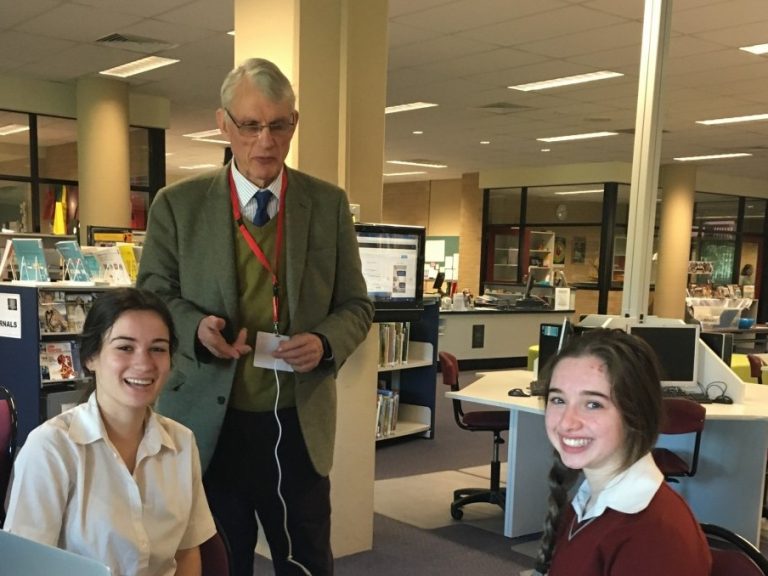In the first week of May a group of Year 10 students and staff were privileged to spend time with visiting philosopher and ethicist Dr Peter Vardy of the University of London. On Tuesday 2 May the girls accompanied by Ms Newbond and Mrs Armen travelled to St Joseph’s College Hunters Hill where they grappled with the theme of ‘’ The following day, Santa Sabina hosted a conference for visiting teachers where Dr Vardy’s topic was ‘End of Life Issues’ – an increasingly complex topic in contemporary society.
Year 10 student Courtney Cousins shared the following reflection on her day at St Joseph’s. Her thoughts so aptly summarise what an experience with Peter Vardy is like.
When we signed up for an ethics lecture with the English philosopher Dr Peter Vardy, the day was advertised as ‘fast -paced’. But that was a lie. Fast paced is an understatement.
By the end of the day, I had pages and pages of notes on a myriad of topics, from politics to love, Aristotle to climate change, Christianity to Voldemort and Harry Potter. And wow. When most think of philosophy, they may think of, for example, ‘Does the universe exist?’ Answer: Yes or No. Dr Vardy hardly touched on this tired question (not that it’s unimportant), but rather focused on answering ‘What does it mean to be human? Are we different from animals or are we the same? Do souls make use different from humans, or is it the ability to reason? Does truth exist? If it does, what is it? Is the aim of life to be happy? And who are people being happy here anyway?’
It was a lot for a Year 10 ethics excursion. Our heads swirled by the end. What was most impressive perhaps was Dr Vardy’s relevance. His information was gathered from just three weeks ago. Did you know the Japanese have invented beautiful female robots for commercial use? Not male ones though … they are coming.
And Britain has given the okay for animal DNA injections into human embryos (the embryo needs to be destroyed after 10 days)? His topics, especially about love, and his use of modern media were just perfect for the adolescent audience.
And I have some new popular culture knowledge now. The Harry Potter series is all about death. That’s why Rowling wrote it. Voldemort doesn’t believe in an afterlife – that’s why he says ‘There is no good or evil, there is only power, and those too weak to seek it.’ Dumbledore and Harry think death is the next big adventure. That’s why Dumbledore says “Love!” I think this means J.K Rowling isn’t an atheist.
We all enjoyed it. So much. It was enlightening, with a capital E. I would recommend it for everyone.
Thanks to Courtney for such an engaging report. I was present at the day for teachers on the ‘end of life’. I can assure you that in the words of another Year 10 student I also felt ‘like my brain would explode’ by the end.
We look forward to further opportunities to explore eternal and emerging questions with our students in the continued pursuit of Veritas.
Helen Smith
Head of Religious Education




